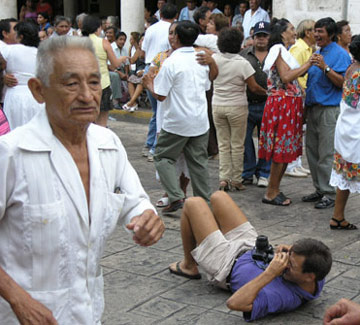|
Read about student experiences, comments, and program evaluations
General Description
OSEA Heritage Ethnography Field School provides training in ethnographic field work and research methods. The program is open to undergraduate and graduate students in any social science and humanities field, as well as to post-baccalaurates. Participants enroll in two courses. The core seminar provides an anthropological approach and the analytical foundations for understanding and investigating heritage in local and global contexts. The ethnographic methods and fieldwork practicum consists of three components. One unit is an intensive introduction to spoken Maya langauge for use in the conduct of fieldwork. The second unit is a classroom seminar in which ethnographic methods are presented and discussed. The goal is for students to design practical research projects on heritage issue in the Maya communities in the region of Chichén Itzá. The third component is the fieldwork practicum in which students actually conduct the ethnographic research they have designed. The fieldwork is closely supervised and punctuated with participation in a fieldwork forum or workshop in which students discuss their sucesses and difficulties and a student “conference” presentation of their research results. Participants can choose to do ethographic projects with a traditional research agenda or as an applied/action-based research. Projects are designed as individual fieldwork or as collaborative research articulated to the ongoing investigation of heritage and tourism development in the Pisté-Chichén Itzá socioeconomic microregion.
Intensive One Week Spanish Immersion Program specially designed for OSEA Participants
Tarifas Especiales para Mexicanos y Latinoamericanos
New PreMed / Medical Anthropology program "Maya Health and Healing" -- do shadowing research with traditional Maya healers
Summer: 7 week program. See OSEA calendar of activities
Dates: 2013: Noon Sunday June 9 to noon Saturday July 27
2012 June 10 to July 28
2011 May 22 to July 9
2010 May 23 to July 10
2009 May 17 to July 4
Start: Start date is the day of Arrival, plan to be in Piste for Orientation Meeting at 1pm.
End: End date is the earliest date of Departure from Piste after 12pm.
Location: Pisté and Chichén Itzá, Yucatán, México, and surrounding Maya Indian communities
Find Cancun on Google Maps— —
Find Pisté & Chichén Itzá on Google Maps
Credits: 8 credit hours, at undergraduate or graduate level.
3 credits “Seminar in Heritage Ethnography”
5 credits “Ethnographic Methods and Field Research Practicum”
See course descriptions here
Cost: $3300 Direct OSEA Enrollment*
$3000 Early Decision Tuition Rate, Submitted by February 1
Includes: Tuition, Program Fees, Homestay room & board, Group Trips/Events
Not Included: Airfare, Transportation to/from Pisté, Incidentals, Program Break
Eligibility:
Program is open to: undergraduate majors and graduate students in any social science, art, culture, communications, and applied research fields; persons who have completed a BA, MA, or other higher degree but are not currently enrolled in a degree program.
Requirements:
GPA of 2.3 for coursework taken to date
Completion of Freshman year of college, university, or equivalent institution
Minimum 1 year of college level Spanish, 3 years High School Spanish, or demonstrated proficiency
No prior coursework or knowledge in Maya language is necessary
Lodging:
Home-stays provide linguistic and cultural immersion; options for lodging and food in family-run posadas are available at an additional cost. Families are carefully selected based on the Program Director’s 24 years of experience in the community of Pisté. Participants are required to purchase a hammock for sleeping in homestays; a special hammock shopping trip to a nearby town is organized during the first days of the program.
Other Details:
The program begins with intensive language training and a core seminar on heritage that provides participants the linguistic skills and conceptual tools to conduct fieldwork in Maya communities on heritage issues. Heritage is conceived as an inclusive domain that includes social processes and problems involving archaeological heritage development, tourism, sustainability, community participation and control of development, state policy and strategies of tourism, intangible cultural heritage such as handicrafts production and art markets, Maya medicine and systems of health and healing, urbanism and environmental heritage.
Mexican and other Latin American Nationals who are not Studying in the USA or Europe:
Special pricing for Mexican and other Latin American citizens is available. To be eligible you must (1) not have US citizenship or passport nor have a dual citizenship with the USA and an other country. (2) You must not have studied for or be currently enrolled in a high school, bachelors, masters, graduate certificate, or doctoral program in the USA or in any country of Europe. (3) You must be a citizen of and reside in Mexico, Latin America or other qualifying country with full time residency. (4) You must be able to provide proof of advanced levels of English proficiency of sufficient level to be able read and comprehend English language texts and successfully participate in the ethnography program.
Mexican, Latin American and other qualifying nationals can receive up to a 55% discount on OSEA programs. Each program rate is different. Discounted tuition rate for OSEA Heritage Ethnography Field School is $1650.
* Direct OSEA Enrollment allows students from any university with any residence status or nationality to enroll directly with OSEA. Payment is made directly to OSEA as per guidelines described in the application process and on the OSEA website. Upon completion of the program the student receives an OSEA transcript and a transcript from its accredited partner the Universidad Autónoma de Yucatán or UADY. In order to facilate the transfer of credits, students receive two copies of each transcript in two separate sealed envelopes in September following the completion of summer program. One of these sealed and stamped envelopes should be stored among your important papers and the second envelope is then hand-delivered by the student to the registrar of their university in order to comply with their rules for accepting transfer credits. Please note that your university may have a policy that requires the registrar to reject transcripts delivered in envelopes that have been tampered with or broken.
|



